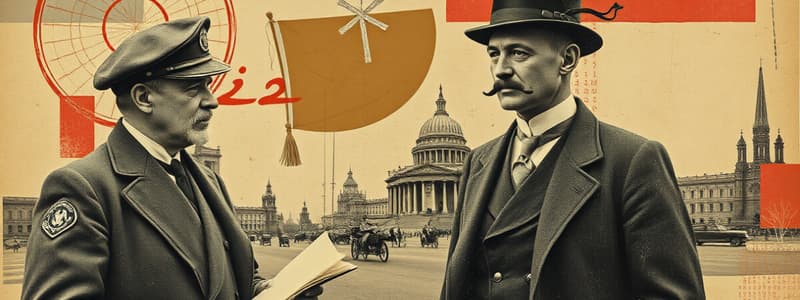Podcast
Questions and Answers
What is history?
What is history?
- The study of the people and events of the past (correct)
- The study of animals
- The study of geography
- The study of the future
Who are historians?
Who are historians?
People who study history.
How does learning about the past help us?
How does learning about the past help us?
It allows us to understand the present better.
Historians label time in different ways to identify and describe when something happened.
Historians label time in different ways to identify and describe when something happened.
How many years are in a decade?
How many years are in a decade?
How many years are in a century?
How many years are in a century?
How many years are in a millennium?
How many years are in a millennium?
What does Prehistory refer to?
What does Prehistory refer to?
What calendar did Julius Caesar develop?
What calendar did Julius Caesar develop?
Does the Gregorian Calendar lose time?
Does the Gregorian Calendar lose time?
Who uses the Gregorian Calendar today?
Who uses the Gregorian Calendar today?
What do B.C. and A.D. stand for?
What do B.C. and A.D. stand for?
What is the purpose of a timeline?
What is the purpose of a timeline?
What do archaeologists study?
What do archaeologists study?
____ study fossils to learn from the remains of plant and animal life.
____ study fossils to learn from the remains of plant and animal life.
What do historians use to interpret what happened in the past?
What do historians use to interpret what happened in the past?
What are primary sources?
What are primary sources?
What does bias mean in historical research?
What does bias mean in historical research?
What is the use of note cards in research?
What is the use of note cards in research?
What should evaluations of history be based on?
What should evaluations of history be based on?
Flashcards are hidden until you start studying
Study Notes
Understanding History
- History examines the past, focusing on people and events, emphasizing changes over time.
- Historians investigate the causes behind historical events.
Importance of Studying the Past
- Learning history enhances understanding of the present and informs future decision-making.
Time Measurement and Labeling
- Time is labeled in various ways: decades (10 years), centuries (100 years), and millennia (1,000 years).
- Eras segment history into larger periods.
Calendars and Timekeeping
- Various cultures have developed around 40 different calendars, often influenced by nature.
- The Julian calendar, initiated by Julius Caesar, counted years from the founding of Rome and included leap years.
- The Gregorian calendar, established by Pope Gregory XIII in 1582, began counting from Jesus’ birth and is widely used today.
Historical Dating Systems
- B.C. (Before Christ) denotes years before Christ's birth; A.D. (Anno Domini) signifies years after.
- B.C.E. (Before Common Era) and C.E. (Common Era) are secular terms to reference the same periods, avoiding religious connotations.
- Dates in B.C. count backward from A.D. 1, with no year zero.
Timelines
- Timelines illustrate event sequences and the duration between them, organized into equal segments.
The Role of Writing in History
- The invention of writing enabled the documentation of significant events, providing historians insight into the past.
- Pre-writing eras require alternative methods for understanding history.
Fields Related to History
- Archaeology involves studying physical remains to understand past cultures.
- Paleontology examines fossils to learn about extinct life forms.
- Anthropology focuses on cultural development and values over time.
Interpreting Historical Evidence
- Historians analyze primary sources (firsthand evidence) and secondary sources (interpretations created later).
- Trustworthiness of sources is vital; bias can compromise reliability.
- Inferences are drawn from evidence to reconstruct past events.
Research Practices in History
- Historians assess the credibility of sources and seek diverse perspectives to gain clarity on events.
- Accurate representation of history is essential, with peer reviews ensuring factual correctness.
Tools and Techniques
- Note cards facilitate organized research and summarization of findings.
- General reference books like encyclopedias and textbooks provide foundational knowledge.
Ethical Research Conduct
- Distinguishing between fact and opinion is crucial to evaluating source reliability.
- Plagiarism is presenting another's work as your own; proper citation and paraphrasing are necessary to avoid this.
Evaluating Historical Perspectives
- Historical evaluations should be evidence-based, recognizing that contemporary views may differ from past contexts.
Studying That Suits You
Use AI to generate personalized quizzes and flashcards to suit your learning preferences.




